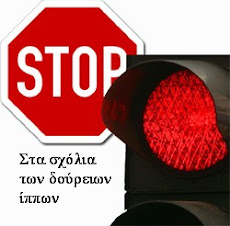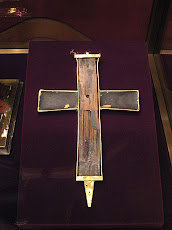Νίκος Τανάλιας Bretton Woods Conference
The Netherlands, Greece, Australia, India, Yugoslavia, New Zealand, France, Ethiopia, Norway and Britain then added their comments and objections.
Πηγή: http://www.nytimes.com/.../transcript-of-1944-bretton....
The Netherlands, Greece, Australia, India, Yugoslavia, New Zealand, France, Ethiopia, Norway and Britain then added their comments and objections.
Πηγή: http://www.nytimes.com/.../transcript-of-1944-bretton....
Transcript of 1944 Bretton Woods Conference Found at Treasury
Acting Secretary of State Dean Acheson, standing at center, and representatives of 28 Allied nations met in Washington in 1945 to sign the pact reached at the Bretton Woods conference.
By ANNIE LOWREY
Published: October 25, 2012
http://www.brettonwoods.org/in_the_news/transcript-of-1944-bretton-woods-conference-found-at-treasury
WASHINGTON — A Treasury economist rummaging in the department’s library has stumbled on a historical treasure hiding in plain sight: a transcript of the Bretton Woods conference in 1944 that cast the foundations of the modern international monetary system.
The Bretton Woods Transcripts
The Center for Financial Stability has included links to the transcripts on its web site.
International Monetary Fund, via Agence France-Presse — Getty Images
John Maynard Keynes addressed the Bretton Woods conference, where the International Monetary Fund was created.
Historians had never known that a transcript existed for the event held in the heat of World War II, when delegates from 44 allied nations fighting Hitler gathered in the mountains of New Hampshire to create the International Monetary Fund and the World Bank. But there were three copies in archives and libraries around Washington that had never been made public, until now.
“It’s as if someone handed us Madison’s notes on the debate over the Constitution,” said Eric Rauchway, a historian the University of California, Davis.
Economic historians who have viewed the transcript say it adds color and detail to the historical record, an already thick one given the many contemporaneous and subsequent accounts of Bretton Woods. The transcript seems to contain no great surprises, but it sheds light on the intense debates as the war raged abroad.
It depicts John Maynard Keynes, the British economist, hurrying to marshal support for the broad agreements on international finance. It underscores the tremendous power then wielded by Britain and, especially, the United States. It also shows the seeds of contemporary disputes being sown.
For instance, seven decades ago, a number of poorer or smaller countries were protesting their International Monetary Fund quotas, which determine power in the fund. Many of those countries, including China and India, are still pushing for more influence today.
In one section of the transcript, an American representative lays out a proposal for apportioning power in the fund and underscores what was at stake, with the war coming to its bloody climax in Europe.
“We fight together on sodden battlefields. We sail together on the majestic blue. We fly together in the ethereal sky,” said Fred M. Vinson, who later became chief justice of the United States. “The test of this conference is whether we can walk together, solve our economic problems, down the road to peace as we today march to victory.”
But the response was not one of absolute unity.
“In spite of the very eloquent and moving speech of the United States delegate, on behalf of the Iranian delegation I wish to state that the quota proposed for my country is entirely unsatisfactory,” a delegate from Tehran responded.
Then, a delegate from China added: “I hesitate greatly to sound a note of discord at this conference. It has been the effort of the Chinese delegation to promote harmony and the success of this great common enterprise. But every delegation has its difficulties.”
The Netherlands, Greece, Australia, India, Yugoslavia, New Zealand, France, Ethiopia, Norway and Britain then added their comments and objections. “I think that a lot of people have thought of Bretton Woods as being a stitch-up job between United Kingdom and the United States,” Mr. Rauchway said. “But that’s overstated, and it’s definitely visible in this transcript. You can see the poorer countries fighting their own corner.”
Kurt Schuler a Treasury Department economist, was browsing in an “out of the way” section of uncataloged material in the library two years ago when he came across the Bretton Woods document. He flipped through and saw some remarks by Keynes that he was not familiar with, sort of the economists’ equivalent of a Bob Dylan fan finding unknown lyrics.
“I checked them against Keynes’s collected works,” Mr. Schuler said. “And I knew I had something.”
His research revealed that there were three copies of the transcript that scores of economic historians were not aware of: the version at the Treasury Department; one in the National Archives; and the third in the International Monetary Fund archives.
In his spare time, Mr. Schuler set about turning the yellowed transcript into a book, with a co-editor, Andrew Rosenberg. It took a tremendous amount of work, Mr. Schuler said. They read the transcript aloud into transcription software. They added hyperlinks to documents referenced at the conference, and wrote summaries, annotations and historical notes.
This week, the polished transcript was published as an 800-page e-book by the Center for Financial Stability, a nonprofit group based in New York that researches financial markets, where Mr. Schuler is a senior fellow and Mr. Rosenberg a research associate.
“Everyone thinks they know what happened at Bretton Woods, but what they know has been filtered by generations of historical accounts,” Barry Eichengreen, a professor or economics and political science at the University of California, Berkeley, said in a statement. “International monetary history will never be the same.”
The transcript provides “insight in how it was that they were able to maintain a pace of work which allowed them to reach two really big agreements, on the I.M.F. and the World Bank, within a space of three weeks,” Mr. Schuler said. “Keynes was something of a task master,” he added.
Benn Steil, a senior fellow and director of international economics at the Council on Foreign Relations, said readers can see the British Empire “disintegrating before your eyes,” in the transcript. “The Indians are so vociferous that the British are ripping them off. The British are both furious and mortified that their colony would do this to them,” he said, describing a dispute over debts with the colonies.
“Bretton Woods was itself 95 percent Kabuki theater,” he said. “But it’s interesting Kabuki theater.”
«ΤΟ ΣΥΣΤΗΜΑ ΤΟΥ BRETTON WOODS» ΤΙ ΕΣΤΙ "Διεθνής Τράπεζα";;
Διαβάστε την Συμφωνία του "Bretton Woods" για την δημιουργία της Διεθνούς Τράπεζας για την Ανασυγκρότηση και την Ανάπτυξη, ή αλλιώς αποκαλούμενη ως Διεθνής Τράπεζα.
A. Bretton Woods Agreements Act, International Monetary
Fund/World Bank Group.
[As Amended Through P.L. 113-6, Enacted March 26, 2013]
http://www.house.gov/legcoun/Comps/bretton.pdf
A Decade of American Foreign Policy 1941-1949
The Bretton Woods Agreements
http://avalon.law.yale.edu/20th_century/decad047.asp
Μια δεκαετία της Αμερικανικής Εξωτερικής Πολιτικής 1941-1949
Οι συμφωνίες του Bretton Woods
H ΜΕΤΑΦΡΑΣΗ google: http://translate.google.com/translate?hl=el&sl=en&tl=el&u=http%3A%2F%2Favalon.law.yale.edu%2F20th_century%2Fdecad047.asp&sandbox=1
http://www.centerforfinancialstability.org/images/bretton_cover.pdf
http://www.centerforfinancialstability.org/bw/Proceedings_TOC.pdf

Historic Documents and Memorabilia
Unpublished Conference Documents

July 1, 1944 Bretton Woods Conference
Source: United Nations
More Photos
Show More Transcripts
Διαβάστε την Συμφωνία του "Bretton Woods" για την δημιουργία της Διεθνούς Τράπεζας για την Ανασυγκρότηση και την Ανάπτυξη, ή αλλιώς αποκαλούμενη ως Διεθνής Τράπεζα.
A. Bretton Woods Agreements Act, International Monetary
Fund/World Bank Group.
[As Amended Through P.L. 113-6, Enacted March 26, 2013]
http://www.house.gov/legcoun/Comps/bretton.pdf
A Decade of American Foreign Policy 1941-1949
The Bretton Woods Agreements
http://avalon.law.yale.edu/20th_century/decad047.asp
Μια δεκαετία της Αμερικανικής Εξωτερικής Πολιτικής 1941-1949
Οι συμφωνίες του Bretton Woods
H ΜΕΤΑΦΡΑΣΗ google: http://translate.google.com/translate?hl=el&sl=en&tl=el&u=http%3A%2F%2Favalon.law.yale.edu%2F20th_century%2Fdecad047.asp&sandbox=1
http://www.centerforfinancialstability.org/images/bretton_cover.pdf
http://www.centerforfinancialstability.org/bw/Proceedings_TOC.pdf
Historic Documents and Memorabilia
Unpublished Conference Documents
The PDF files below contain photographs of documents circulated at the Bretton Woods conference, from daily news bulletins to the telephone directory at the Mount Washington Hotel. These documents were not published in the 1948 conference proceedings because they were considered to be of low interest. We found many but not all of the unpublished conference documents. Many of the PDF files are very large and not easily viewed with slow Internet connections.
Questions and Answers on the Bank for Reconstruction and Development (June 10) New!
- Also available in a more readable format as a CFS paper New!
Document 20 Provisional Telephone Directory (July 1)
Document 33 Secretariat Notice (July 1; Numbering Duplication)
Document 39 Secretariat Notice (July 1?; Maplewood-Mount Washington Bus Schedule)
Show More Documents
- Also available in a more readable format as a CFS paper New!
Document 20 Provisional Telephone Directory (July 1)
Document 33 Secretariat Notice (July 1; Numbering Duplication)
Document 39 Secretariat Notice (July 1?; Maplewood-Mount Washington Bus Schedule)
Show More Documents
Memorabilia
July 1, 1944 Bretton Woods Conference
Source: United Nations
More Photos
The Bretton Woods Project at the CFS offers many photographs of historic figures at this iconic conference. Similarly, the Project seeks to build a living library of images and recordings from the conference or from those who were directly impacted by the conference. If you have images that we can digitize and share with the public, please contact Kurt Schuler,kschuler@the-cfs.org.
The Original Transcripts
The PDF files below contain photographs of the typewritten transcripts of meetings at the Bretton Woods conference. The transcripts are keyed to the corresponding chapters in the book. Many of the PDF files are very large and not easily viewed with slow Internet connections.
Commission I: International Monetary Fund
| ||||
| Chapter 2 First Meeting | July 3, 1944 | Transcript | ||
| Chapter 3 Second Meeting | July 5 | Transcript | ||
| Chapter 4 Third Meeting | July 10 | Transcript | ||
| Chapter 5 Fourth Meeting | July 13 | Transcript | ||
| Chapter 6 Fifth Meeting | July 14 | Transcript | ||
| Chapter 7 Sixth Meeting | July 15 Afternoon | Transcript | ||
| Chapter 8 Seventh Meeting | July 15 Evening | Transcript | ||
| Chapter 9 Eighth Meeting | July 18 | Transcript | ||
| Chapter 10 Ninth (Final) Meeting | July 19 | Transcript | ||
Proceedings and Documents of the Bretton Woods Conference
In 1948 the U.S. Department of State issued a two-volume set of proceedings from the Bretton Woods conference. The proceedings contain minutes of all major and most minor committee meetings. The ground rules of the conference, however, stated that minutes would generally avoid telling who said what. Minutes are accordingly much shorter than the corresponding transcripts, usually only describing the outcome of debates and smoothing over controversies rather than giving the full flavor of what transpired.Our Table of Contents Volume 1 (external link, very large PDF file) Volume 2 (external link, very large PDF file) |
Further Material
- Excel file showing the evolution of the IMF and World Bank agreements. The file shows four stages of the IMF agreement, from the pre-Bretton Woods “Joint Statement” to the final agreement, and the initial draft and final version of the World Bank agreement.
- “Planning for Postwar Economic Cooperation: The U.S. Treasury, the Soviet Union, and Bretton Woods (1933-1946)” (Ph.D. dissertation, St. Louis University, 2000, copyrighted by Peter Acsay and reproduced with his permission; click here for his Web site)
- “Bretton Woods Agreements: A Bibliography, April 1943-December 1945” Library of the Board of Governors of the Federal Reserve System. Detailed; compiled 1946. Very large PDF file.
- Archives of the International Monetary Fund (see “Bretton Woods Conference Collection”)
- FRASER (Federal Reserve Archival System for Economic Research)






Δεν υπάρχουν σχόλια:
Δημοσίευση σχολίου